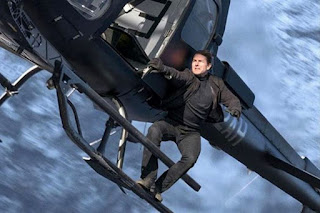RIP, Burt Reynolds
There was a time when Burt Reynolds was, well, the coolest. His masculinity came with self-deprecation that underscored his self-confidence, his aggressiveness made room for some vulnerability. He could pose for Cosmopolitan -- you knew I couldn't leave that out -- and it was just a little romp. Men and women liked him, and -- key to his leading-man appeal -- he came across as someone who really liked women, and not just for a hop in the sack. Women could look at his relationship with Sally Field, onscreen and off, and think, well, if Sally Field likes him. ...
He was, in short, George Clooney before Clooney.
And he knew how to reach across demographics: appealing to a Southern, drive-in kind of audience in some films; the action crowd in others, and the people who took movies seriously in a third.
I was a southerner who loved action movies and good films, so I saw a lot of Burt Reynolds in the '70s: Fuzz, Deliverance, Everything You Always Wanted To Know About Sex, White Lightning, The Longest Yard, W.W. and the Dixie Dancekings (a personal favorite, don't judge), At Long Last Love (a terrible musical, but one where Reynolds absolutely charmed), Lucky Lady, Nickelodeon, Smokey and the Bandit, Semi-Tough (misunderstood adaptation of the novel but, again, Reynolds was right for the part), The End, Hooper, Starting Over (very sweet, and nice acting from Reynolds), Smokey and the Bandit, Paternity, Sharkey's Machine ... some of which he ably directed ...
Only now I'm into the '80s, where the Reynolds magic really started to fade -- and we were beset with the likes of The Best Little Whorehouse in Texas, Cannonball Run, City Heat, Rent-a-Cop, Switching Channels ... and I would only be seeing a Burt Reynolds movie if I stumbled over it on HBO or found nothing else at the video store.
Still. While he gave more than one lazy performance (see, or don't see, Cannonball Run II or Stroker Ace), he more than proved he had the chops. Following those awful movie years, the first hint of a rebound was on television, where he starred from 1990 to 1994 in Evening Shade, an amiably low-key comedy where Reynolds comfortably centered an impressive cast (Hal Holbrook, Elizabeth Ashley, Ossie Davis, Reynolds' frequent co-star Charles Durning, Michael Jeter ... You don't coast in that crowd).
His official comeback then came in 1997's Boogie Nights. Directed by Paul Thomas Anderson, Reynolds is the emotional center of the film; Mark Wahlberg's Dirk Diggler is doomed from the start, a person of no talent or intelligence, where Reynolds' Jack Horner is, yes, a porn idealist -- believing that somehow what he does can be shot-on-film art -- and so is ruined when cynicism and video overwhelm the business. He survives the changes, but loses his dream -- and Reynolds hits that note just right.
He received an Oscar nomination for that one, the only nomination of his career. But by this time Reynolds seemed to have soured on a life. His 1993 split from wife Loni Anderson (no relation to Paul) went decades before all the finances were settled, with the Los Angeles Times noting in 1994 that Reynolds was up to his neck in debt from bad investments and other problems; he filed for bankruptcy in 1996, and over the years had "IRS run-ins, addiction and rehab (and) auctions of his prized belongings." Even that Cosmopolitan pose became an embarrassment to him.
And that Oscar nomination came for a film that Reynolds publicly said he had not liked making, dogging director Anderson even as Anderson was becoming an Oscar darling (eight nominations to date, not counting the nominations and wins for others on his films). Reynolds, his most successful films unlikely to have registered with show biz's next generation, sounded off about Anderson in a way that sounded close to "get off my lawn, you cocky punk."
So he's gone, at 82, and his movies aren't ones that I go back to much. But at the best, when I wanted to have fun in a theater, it was a fair bet that Reynolds could provide it.



Comments
Post a Comment